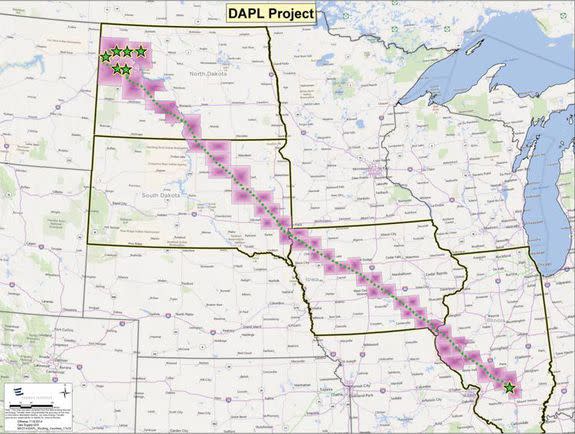Protests to block North Dakota oil pipeline are heating up

In the heart of North Dakota's prairie lands, tribal leaders and their allies are squaring off against a Texas pipeline builder and the federal government.
Over a thousands protesters have gathered during the past two weeks in a grassy camp near the town of Cannon Ball to physically block construction of the Dakota Access Pipeline in the area.
Led by the Standing Rock Sioux tribe, the opponents are also hoping to halt the 1,170-mile project in court.
SEE ALSO: Here's where climate activists are setting their sights in 2016
On Wednesday, the U.S. District Court for the District of Columbia will hear the tribe's lawsuit, which claims a federal agency violated multiple statutes for protecting clean water and culturally significant sites by issuing permits to Energy Transfer Partners, the pipeline's builder.
The hearing in Washington D.C., scheduled for the afternoon, could determine whether the $3.8 billion pipeline continues as planned, or faces extensive and costly delays. Construction was put on hold pending the court's decision.
If it is completed, the Dakota Access Pipeline would carry 570,000 barrels of light crude oil per day from North Dakota's Bakken and Three Forks shale formations to Patoka, Illinois, passing through South Dakota and Iowa along the way.
In comparison, the controversial Keyston XL pipeline, which President Barack Obama rejected in November, would have run 1,179 miles from Canada to Nebraska and carried up to 830,000 barrels a day of heavy Canadian oil sands crude.
A section of the Dakota Access Pipeline would run underneath the Missouri River, a federally protected waterway. The Standing Rock Sioux Reservation — home to roughly 15,000 members and spanning 2.3 million acres — lies just upstream from that river crossing.

Image: Energy Transfer Partners
Dave Archambault II, chairman of the Standing Rock Sioux tribe, claimed the Dakota Access conduit could "poison" the region's water supplies if the pipeline breaks or leaks where it crosses the river.
"It will not be just harmful to my people, but its intent and construction will harm the water in the Missouri River, which is one of the cleanest and safest river tributar[ies] left in the United States," Archambault said in an Aug. 15 statement.
He said the pipeline's environmental threats were not merely a tribal issue, but "a human issue."
Most of the pipeline's proposed route cuts across private land, meaning Energy Transfer Partners only needs the approval of the affected landowners and local governments.
But federal approvals are required where the project crosses bodies of water, such as the Missouri River.
Energy Transfer Partners said the project meets "all applicable federal, state and local environmental laws, regulations and standards," according to a company fact sheet. "We continually seek ways to enhance our operations in the areas of environmental and resource protection and conservation," the company says.
In its lawsuit, the Standing Rock Sioux tribe accused the U.S. Army Corps of Engineers of failing to fully comply with the federal Clean Water Act, National Historic Preservation Act and National Environmental Policy Act when the agency approved the pipeline's construction on July 25.
"The construction and operation of the pipeline, as authorized by the Corps, threatens the tribe’s environmental and economic well-being, and would damage and destroy sites of great historic, religious, and cultural significance to the tribe," lawyers for Standing Rock Sioux members said in a filing to the U.S. District Court for the District of Columbia.
The Corps did not return Mashable's request for comment by deadline.
In legal filings, the agency has rejected the tribe's accusations and said it consulted extensively with the tribes, including the Standing Rock Sioux tribe, before issuing the pipeline permits.
